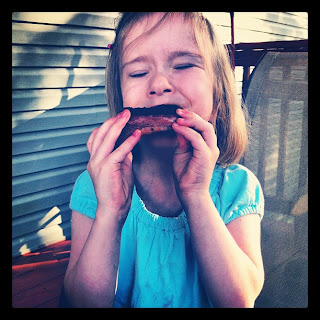I am not a theologian. I am far from a bible scholar. But I always thought that it was odd to call the day Jesus died "Good Friday." Good doesn't seem to capture the amazing, awe-inspiring, gracious, precious, (insert applicable adjectives) that this day is. The day Jesus died on the cross for my sins and in my place; for the sins of the whole world; in the place of every person. But then I think back to Genesis. When God created the world and everything in it, "He saw all that he had made, and it was very good." (Gen 1:31). So I guess that it makes sense that the day His Son fulfilled the law and the prophets, we would call it good.
Last night at our group, we talked about James chapter 2. The second half of the chapter deals with faith and deeds. And I think that today, in light of the amazing sacrifice of my Savior, it is worth trying to articulate what has impacted me most. The sections begins, "What good is it, my brothers, if someone says that he has faith but does not have works?" (James 2:14). I have heard that statement in my head so much this last week "What good is it??" What good is it to say that Jesus died for my sins on this GOOD Friday if I don't live like it?
As mentioned in a previous post, I am reading A.W. Tozer's
The Pursuit of God and he has this amazing chapter called "Removing the Veil". [Brief background: Jesus was arrested; handed over to Pontius Pilate; sentenced to crucifixation; beaten; hung on the cross. When he breathed his last, Matthew captured this moment in chapter 27 "Jesus cried out again in a loud voice and yielded up his spirit. And behold, the curtain of the temple was torn in two, from top to bottom." (Matt 27: 50-51). This curtain was what separated God from people. Only once a year could the high priest enter to offer sacrifices--and someone once told me that they tied a rope around his waist in case he died in there, they could drag him out without having to go in after him. It separated the world from the "Holy of Holies."] Jesus death made a way for every person to enter into the presence of God--a real, intimate relationship with the Creator of the world. Tozer posed a question in his chapter "With the veil removed by the rending of Jesus' flesh, with nothing on God's side to prevent us from entering, why do we tarry without?" His explanation is that we have a veil of SELF (self-righteousness, self-pity, self-confidence, self-sufficiency, self-admiration, self-love...) that keeps us from entering into his presence.
Going back to James--what good is it that Jesus died if I won't enter into the Holy of Holies? What good is it that he gave up everything for my sake if I am not willing to do the same for him? Tozer continued the chapter talking about how we have to crucify the self-life. It is a veil that must be torn in two just like the one that was torn when Jesus died. "We must confess, forsake, repudiate the self-life, and then reckon it crucified." He ends the chapter with this...
The cross is rough, and it is deadly, but it is effective.
It does not keep its victim hanging there forever.
There comes a moment when its work is finished and the suffering victim dies.
After that is resurrection glory and power, and the pain is forgotten for joy that the veil is taken away and we have entered into actual spiritual experience the Presence of the living God.
I don't share any of this because I have it figured out. I share it because I hope it excites someone as much as it excited me. That I get to take part in this day. I can share in this Good Friday--crucifying this self-life that I have hid behind for so long. Enter into the Holy of Holies and experience the Presence of God more and more everyday. I'll end with a couple verses from Hebrews 10 that I LOVE..."[S]ince we have confidence to enter the Most Holy Place by the blood of Jesus, by a new and living way opened for us through the curtain, that is, his body, and since we have a great priest over the house of God, let us draw near to God with a sincere heart with full assurance of faith.." (Hebrews 10:19-22)































.JPG)

.JPG)
.JPG)
.JPG)









.JPG)
.JPG)
.JPG)


